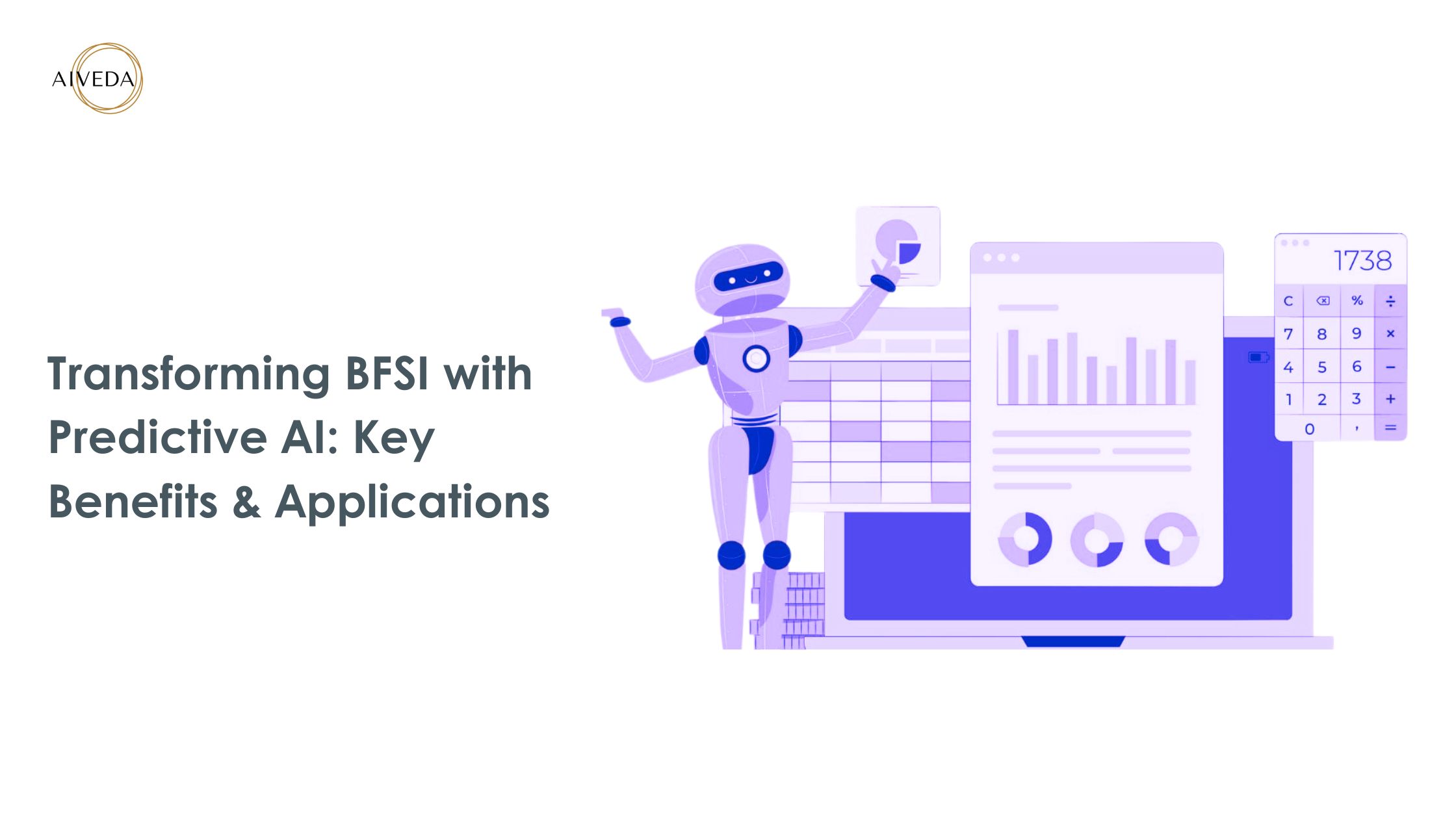
The Banking, Financial Services, and Insurance (BFSI) sector is undergoing a significant transformation, driven by the integration of advanced technologies. Among these, Predictive AI solutions are playing a pivotal role in reshaping the landscape. By leveraging vast amounts of data and sophisticated algorithms, Predictive AI solutions in BFSI enable organizations to forecast trends, mitigate risks, and enhance customer experiences. This blog explores the benefits and applications of Predictive AI solutions in the BFSI sector.
What are Predictive AI Solutions?
Predictive AI solutions utilize machine learning algorithms and statistical models to analyze historical data and make predictions about future events. These solutions help businesses make data-driven decisions by identifying patterns, trends, and anomalies in large datasets. In the BFSI sector, predictive AI can be applied to a wide range of functions, from fraud detection and risk management to customer service and marketing.
Key Components of Predictive AI Solutions:
- Data Collection: Gathering relevant historical and real-time data.
- Data Analysis: Using advanced algorithms to process and analyze data.
- Model Training: Developing and training models to improve prediction accuracy.
- Prediction: Generating forecasts based on analyzed data.
- Optimization: Continuously refining models for better performance.
Benefits of Predictive AI Solutions in BFSI
1. Enhanced Risk Management
One of the most significant benefits of Predictive AI solutions in BFSI is improved risk management. By analyzing historical data, AI can predict potential risks and provide insights to mitigate them.
- Example: Banks can use predictive AI to assess the creditworthiness of loan applicants, reducing the risk of defaults and bad loans.
2. Fraud Detection and Prevention
Predictive AI solutions are highly effective in detecting and preventing fraudulent activities. By identifying patterns and anomalies, AI can flag suspicious transactions in real-time.
- Example: Financial institutions can deploy AI models to monitor transaction patterns and detect fraud before it causes significant financial loss.
3. Personalized Customer Experiences
Predictive AI enables BFSI companies to offer personalized services by understanding customer behavior and preferences. This leads to improved customer satisfaction and loyalty.
- Example: Insurance companies can use predictive AI to recommend personalized insurance plans based on a customer’s risk profile and historical data.
4. Operational Efficiency
AI-driven automation and predictive analytics streamline operations, reducing manual workload and operational costs. This allows BFSI organizations to focus on strategic initiatives.
- Example: Predictive maintenance in ATMs and other banking equipment can minimize downtime and ensure continuous service availability.
5. Informed Decision-Making
Predictive AI solutions provide actionable insights that support informed decision-making. By leveraging data, BFSI organizations can make strategic decisions that drive growth and profitability.
- Example: Investment firms can use predictive analytics to forecast market trends and make informed investment decisions.
Also read – Predictive AI: Foreseeing the Future, Today
Applications of Predictive AI Solutions in BFSI
1. Credit Scoring and Risk Assessment
Predictive AI solutions analyze various factors such as credit history, transaction behavior, and demographic data to generate accurate credit scores. This helps in assessing the risk associated with lending to a particular individual or business.
- Benefit: Reduces the likelihood of bad loans and defaults by accurately assessing borrower risk.
2. Fraud Detection and Anti-Money Laundering (AML)
AI models can monitor transactions in real-time, identify suspicious activities, and flag them for further investigation. This enhances the ability to detect and prevent fraud and comply with AML regulations.
- Benefit: Improves security and compliance, protecting both the institution and its customers from financial crimes.
3. Customer Segmentation and Marketing
Predictive AI can segment customers based on their behavior, preferences, and transaction history. This enables BFSI companies to target marketing efforts more effectively and offer personalized services.
- Benefit: Increases marketing efficiency and enhances customer engagement and retention.
4. Investment Forecasting
AI-driven predictive analytics can analyze market data, historical trends, and economic indicators to forecast investment opportunities and risks. This helps investment firms make data-driven decisions.
- Benefit: Enhances portfolio management and maximizes returns while mitigating risks.
5. Insurance Underwriting
Predictive AI can streamline the underwriting process by evaluating risk factors more accurately and efficiently. This leads to better risk assessment and pricing of insurance policies.
- Benefit: Optimizes the underwriting process, reduces processing time, and improves policy accuracy.
6. Predictive Maintenance
AI solutions can predict maintenance needs for critical banking infrastructure such as ATMs and data centers. This ensures timely maintenance, reducing downtime and improving service reliability.
- Benefit: Minimizes operational disruptions and maintains high levels of service availability.
Implementing Predictive AI Solutions in BFSI
1. Data Integration and Management
Effective implementation of predictive AI solutions requires seamless data integration and management. Ensure that data from various sources is consolidated, cleaned, and prepared for analysis.
- Tip: Use data lakes and data warehouses to store and manage large datasets efficiently.
2. Choosing the Right AI Tools
Select AI tools and platforms that align with your business needs and technical requirements. Consider factors such as scalability, ease of use, and integration capabilities.
- Tip: Collaborate with AI consultants to choose the best tools for your specific use case.
3. Building and Training AI Models
Develop and train AI models using historical data to ensure accurate predictions. Continuously refine these models based on new data and changing business needs.
- Tip: Implement iterative model development and testing to improve prediction accuracy over time.
4. Ensuring Security and Compliance
Implement robust security measures to protect sensitive data and ensure compliance with regulatory requirements. This is crucial for maintaining customer trust and avoiding legal issues.
- Tip: Regularly audit AI systems for compliance and security vulnerabilities.
Conclusion
Predictive AI solutions are transforming the BFSI sector by enhancing risk management, improving customer experiences, and driving operational efficiency. By leveraging the power of predictive analytics, BFSI organizations can make informed decisions, prevent fraud, and deliver personalized services. Embrace the potential of predictive AI to stay competitive and drive growth in the ever-evolving BFSI landscape.